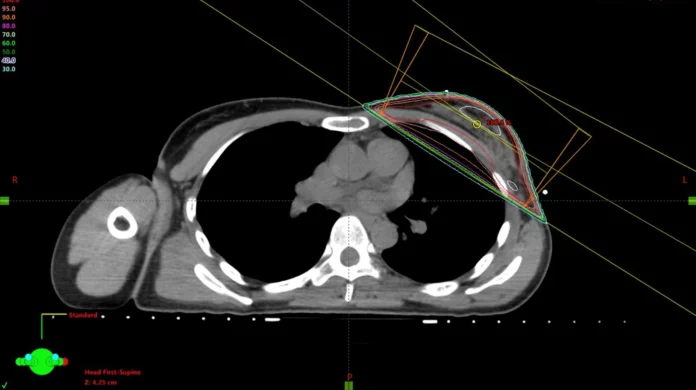Metastasis of breast cancer as solitary metastasis is rare to the sternum. This case is of a successful proton beam therapy for metastasis of breast cancer to the sternum. Moreover, the role of proton therapy in the treatment of oligometastatic sternal metastasis with limited tissue tolerance due to previous photon radiation.
Case Presentation
A 40-year-old Japanese woman presented to another hospital with a complaint of lumpiness in her left breast. She had no family history or medical history of breast cancer or ovarian cancer. Neither did she drink or smoke. Doctors did a core needle biopsy that revealed invasive ductal carcinoma, estrogen, and progesterone receptor-positive and human epidermal growth factor receptor 2-negative. All examination results were significant for the diagnosis of early breast cancer. The patient went through partial mastectomy and dissection of the axillary lymph node. She received radiation therapy and administration of Tamoxifen after it.
Development of Metastasis After Treatment
Six months after her treatment she presented with dull pain in her chest wall and PET-CT showed more than normal uptake FDG in the sternum. The patient had a history of breast cancer hence the possibility of malignant disease other than breast cancer was low on the FDG-PET results. So, doctors omitted the biopsy.
Diagnosis
Doctors made a diagnosis of sternal metastasis of breast cancer and her Eastern Cooperative Oncology Performance Score was 1. They recommended chemotherapy and RT for bone metastasis, however, she refused to get it. She requested PBT for the bone metastasis of the sternum. She was treated with an aromatase inhibitor and LH releasing hormone agonist. This treatment was also started at her previous hospital.
Alternative to RT
She had information about her alternative treatment of PBT, to which she agreed since sternal metastasis was closer to the initial RT field. Due to the high risk of radiation, other methods, for example, stereotactic radiotherapy and volumetric modulated arc therapy were not under consideration.
Despite knowledge about the late complications of PBT through the doctors, she opted for it. The treatment went on for 41 days.




